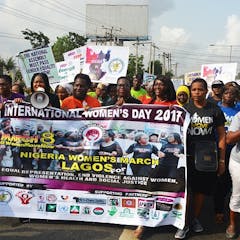
Articles on Nigeria
Displaying 501 - 520 of 1118 articles

Nigeria must invest more in research and incorporate World Health Organisation-recommended interventions to eliminate malaria.

Nigeria needs more veterinary doctors to improve agricultural production, disease prevention, wildlife conservation and the health of animals in the security sector

Plus, why women join Al-Shabaab in Kenya. Listen to episode 12 of The Conversation Weekly podcast.

It’s common to find medical doctors providing supportive health services and in the process getting distracted from their main clinical job concerns.

As the internet continues to alter traditional journalism practices, Nigerian universities must adapt to the times.

Apart from tackling terrorism, banditry and kidnappings, Nigeria’s new Inspector General of Police must embrace community policing.

To overcome food insecurity, especially in a pandemic, Nigeria’s emergency preparedness requires a total overhaul of it’s agri-food supply chain.

Nigeria and China should work more on the relationship between their citizens so that the two countries can continue to have good bilateral relations.

Fela’s nomination and possible induction into the Rock and Roll Hall of Fame will come at a cost.

The insecurity that plagues Nigeria significantly undermines the quality of life for its people.

SMEs must incorporate Total Quality Management practices in their organisational culture for better performance.

Transparent selection processes and merit should be emphasised more in appointing vice-chancellors in Nigerian universities.

Although there had been an increase in violence in Niger since the last election results were announced, the attempted coup, on March 31, raised concerns to a new level in the volatile country.

ECOWAS needs to be decisive in enforcing its protocols and sanctioning members that flout the provisions of its protocols and policies.

Transnational feminism played a huge role in broadening gender studies in most institutions in Nigeria.

Crude is key to inflation. Here’s why has it been going up so much.

Nigeria’s academic community is mourning the death of engineering professor and university administrator, Professor Oyewusi Ibidapo-Obe.

Due to the poor security response of the Nigerian state, insurgency will continue to pose a serious threat to its northeast border communities.

Sustainable financial inclusion in Nigeria requires interventions that strengthen financial capability, participation and well-being of small-scale farmers.

In Nigeria, the unmarried, the unemployed, the less educated and those from the northern parts of the country were most susceptible to psychological challenges associated with COVID-19 lockdown.
